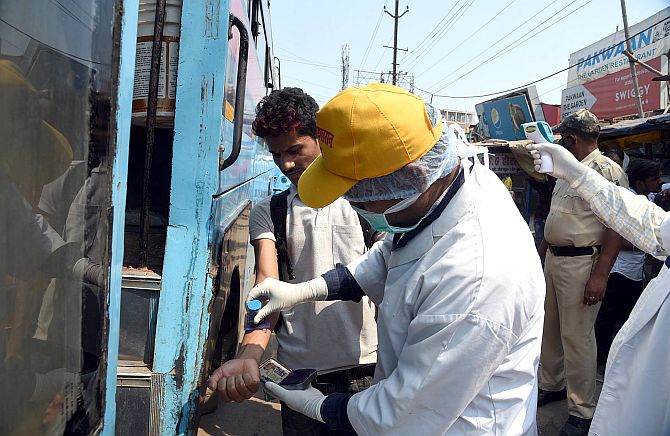An overarching law governing public healthcare is a glaring gap in India’s fight against the COVID-19 pandemic.
In India it is left to individuals to quarantine themselves voluntarily.
Moreover, the 123-year old The Epidemic Diseases Act, 1897, governs healthcare emergencies in India.

Bollywood singer Kanika Kapoor recently hit the headlines after she tested positive for the novel coronavirus (COVID-19) and attended several high-profile parties.
The singer, who had returned from London, reportedly skipped the mandatory 14-day quarantine, which was recommended by the Centre.
Experts point out in India it is left to individuals to quarantine themselves voluntarily.
Most of the infections that have passed on are because people failed to observe the mandatory quarantine and decided to mingle with the crowd, they add.
“The regulations to enforce mandatory quarantine while a person is asymptomatic are still not in place, and that has resulted in a steep rise in infections,” says Nipun Saxena, advocate, Supreme Court.
This is just one example of how public healthcare laws in India fall short of meeting the needs of a pandemic situation.
Even as the government ramps up efforts to tackle the COVID-19 pandemic, the primary law it resorts to is the 123-year old The Epidemic Diseases Act, 1897, that governs healthcare emergencies in India.
The colonial-era law, enacted to fight the bubonic plague in the erstwhile Bombay, comprises four sections spread over just three pages.
Experts point out one of the primary issues facing administrators dealing with the pandemic situation is the federal structure of Indian democracy.
Public health features in the state list under the Seventh Schedule of the Constitution.
The Centre can only advise states to invoke the laws and regulations, not mandatorily impose it, say experts.
“The power granted to the Centre under this Act is very limited, and it is the ultimate discretion of the state government to take a step by framing appropriate regulation,” says Saxena. Moreover, not all states have framed regulations to contain the pandemic.
“Those that have made these regulations have spent valuable time in mulling the pros and cons before notifying them,” he adds.
While the government also declared the disease as a “notified disaster” under the Disaster Management Act, the fact remains that India does not have dedicated legislation for a pandemic situation.
An overarching law governing public healthcare is a glaring gap in India’s fight against the COVID-19 pandemic.
Kashish Aneja, a global health lawyer associated with the World Health Organisation, points out that The Epidemic Act doesn’t meet thresholds under Article 19 and 21 of the Constitution.
He highlights four major gaps plaguing the Act.
These relate to rights of healthcare personnel, travel restrictions, privacy rights, and investments needed to meet the healthcare challenge.
Even though India is a signatory to the World Health Organization’s International Health Regulations (IHR), several gaps need to be plugged in domestic laws, say experts.
For instance, a complete ban on commercial flights may not align with Article 43 of the IHR, which calls for proportionality of such bans to potential risk.
Similarly, the privacy of a patient and disclosure of their medical information needs to balance with public needs.
Experts say no such provision to maintain this balance is available under the current laws.
An overarching law could also include provisions for an emergency fund to deal with such situations.
“The present framework does not give much attention to surveillance, vaccination and public health response,” points out Shashwat Awasthi, a researcher at National Law University, Lucknow.
Around the world, countries have laid great emphasis on strengthening their public healthcare laws to prepare themselves for such pandemics.
In Australia, for instance, Section 51 of the Constitution provides the Federal government with legislative powers to quarantine.
An overarching law called the National Health Security Act and Agreement has been put in place to abide by Australia’s obligations toward the IHR.
The Australian government’s 2011 National Health Emergency Response Arrangements also highlights how the government will respond to public health emergencies.
In the United States, the Department of Health and Human Services (HHS) has laid down specific guidelines to assist states during health emergencies and prevent the spread of communicable diseases.
The Robert T Stafford Act allowed President Donald Trump to unilaterally invoke an emergency.
The HHS’ secretary can make grants and conduct investigations into the cause, treatment and prevention.
Under the Federal Food, Drug and Cosmetic Act, the HHS secretary can justify an emergency use authorisation of medical countermeasures, whereby unapproved drugs, vaccines, or countermeasures can be used in times of emergency.
Such a provision does not exist in India.
Within the European Union (EU), EU Decision 1082/13 is the key legal instrument for threats to health.
They endorse compliance with the IHR.
Both the IHR and Decision 1082/13 require signatory states to develop national plans for pandemic preparedness.
>Many countries have plans in place, which can include measures, such as rationing of resources, enforced isolation or quarantine, or seizure of goods and property.
The WHO and the EU also encourage the use of legal frameworks to support those plans.
In Spain, all private hospitals have been nationalised in the wake of the pandemic.
While such a drastic measure may not take in India, experts speculate about guidelines for public-private partnerships in the medical field.
| Fighting pandemics |
|
Australia: An overarching law called the National Health Security Act and Agreement has been put in place United States: Under the Public Health and Service Act, the US Department of Health and Human Services has laid down specific guidelines to assist states during health emergencies and prevent the spread of communicable diseases EU: EU Decision 1082/13 is the key legal instrument for threats to health, which endorses compliance with WHO’s IHR Spain: All private hospitals have been nationalised in the wake of the pandemic India: The Epidemic Diseases Act, 1897, governs health care emergencies |











